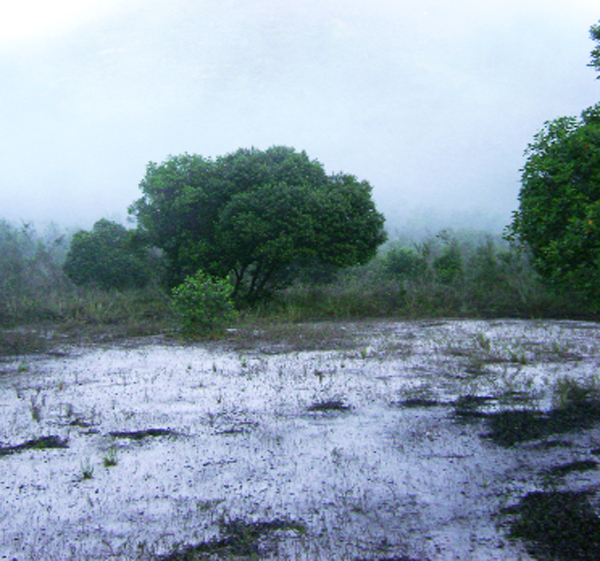Scenic beauty and the contrary world of mining
The mountains are cold in the morning, more so at 3am, and the moisture from the mist drips onto the zinc roof, making little ‘plops’ like tiny frogs jumping into a pool.
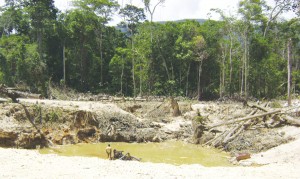
Shivering from the cold which had awoken me in the midst of a nightmare, I threw on some clothes and burrowed under the thin sheets. No use. The cold invaded everywhere, and outside the window there was a white world. Nothing moved in the mist; it seemed that nothing could penetrate it.
It was Sunday and as I had learned the day before, the water in the tank would be extremely cold. This was the day for the visiting the mines but the cold only made me think of staying under the covers until the sun was high. Sore legs lobbied for this, but knocking on the door propelled me into shivering motion and into the misty morning.
Walking through tall, wet grass that soaked my jeans in a matter of minutes, after breakfasting at the Chief, we left for the farms and the mines. The village councillor, who was my guide, like the majority of villagers, walked very fast and it was a struggle to keep up.
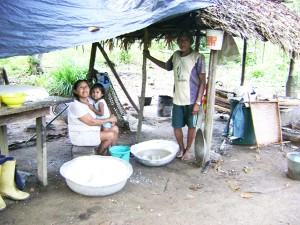
Emptying into the discoloured Arau River are many streams, with clean, dark-coloured water. At some of them, stop-offs, made out of wood and leaves, to prevent the waters from mixing and fish from entering the muddy river, had been built by the locals.
The trip was notable for the number of strange plants (at least to me), the sound of parrots and macaws screaming all around, and the ubiquity of ants. A particular variety of flower with a red centre and a little raised tip was plentiful. Taking off my jeans and entering the muddy Arau to get to the other side, a brief thought crossed my mind about what pollutants the water might contain. Some villagers, who were supposed to accompany us, did not, and had gone through another trail, while the chief lagged behind because of his bad back. The councillor said that the chief could not travel through that trail because of the “bumps.”
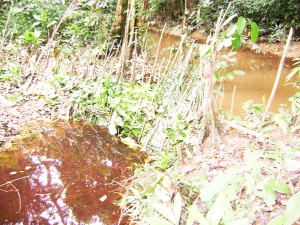
We scrambled over rocky hillsides and across tree trunks serving as bridges. As we climbed higher and higher, the air became cleaner and colder – pure oxygen, I supposed.
Later, gasping for air as I struggled up a particularly high hill I thought, “Bumps? If these are not ‘bumps,’ then what are the ‘bumps’ like?” A field of a certain variety of flower, as many as I have ever seen, splashed itself across a portion on a hill.
Farms on hillsides, with the main crops being cassava and corn, were interspersed with the forest. The councillor said that this area was one of the most fertile parts of the land and that miners often stole their crops. He pointed to several sugarcanes that had been broken at one farm and said that miners traversed this path often. As the mists cleared, the humidity of the rainforest made itself felt and then we came to the first occupied camp.
A short, grey-haired old man, Daniels Matthews, said that he did not know how old he was. A number of small parrots were in a tree in the yard and a number of the young chicks were in a bucket. Matthews could not speak English very well and was assisted by the councillor who translated. “The water like it getting problem, you can’t drink out of it,” he said. He stated that sometimes the little stream that he utilized for water ran dry and then they had to go a long way for water. The elderly grandfather said that his farm had been raided too. “We have problem, sometimes they [miners] cut our cane, our plants, they cut it without asking me… they cut the cane like animals, they just break it without cutting it,” he declared. His wife, Betty, and a little granddaughter baked cassava bread in a pan over the wooden fire. The dog barked incessantly. “I afraid to tell them, sometimes they might shout on me, they might chop me,” he said. He was interrupted by sharp-sounding words from his wife. Matthews had complained to the village council on several occasions and though checks had been made and the miners spoken to, the practice continued. He said that sometimes the miners told him that they wanted to come on his land and asked why the villagers were greedy for it.
Just opposite his farm was one of the mines. The discoloured Arau flowed past slowly, and an open abandoned pit, also filled with discoloured water merged with the river. The sound of engines from dredges, a steady drone, penetrated the stillness. We moved on; another guide, another perspective.
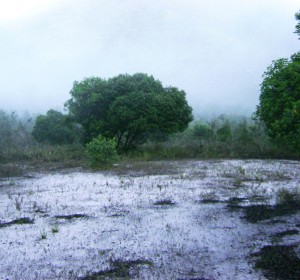
Walking with her baby in her arms, Jacklyn King said that she was afraid of miners and related an incident which had occurred some years ago when, she said, she had almost been shot. The miner had been arrested and charged for unlawful possession of a firearm but because of the distance involved in travelling to the court, the case, according to reports, had been dismissed. The miner reportedly claimed that he had mistaken her for a “bush cow.”
We walked past old mined-out pits; discoloured water flooded the land. King was articulate and spoke in a forceful manner, relating her story. We passed by old farms, and even in the cool, dark of the forest I perspired and breathed heavily.
Kenrick Rudolph’s farm has the mountains as its backdrop. He was cooking some noodles as the women scraped cassava. He had a “mosquito worm” in his leg that would, by the time I left Arau, render him unable to move because of the pain. Upon expressing my curiosity about this, many related their experiences with this affliction. It seems that the “mosquito worm” burrowed under the skin and ate flesh. Residents said that when it “burst” it was very painful and the people had different methods, mainly traditional in nature, to treat it. People here used mostly natural medicines when they were sick.
We visited the river to see the place where it had been diverted. A sluice which was in operation, loomed into view across the river with the sound of its unseen engine filling the air. Rudolph declared that he had been badly affected by the condition of the river, and he talked about dead fish floating on the water, the smell of the river during the dry season, the animals that had moved away, rashes from bathing in the river, and the diversion of the watercourse. Rudolph said that after complaints about the polluted water, the miners had promised to give him a water tank and pipes but had not done so. The old man did not speak English, and neither did his wife, Katty, and their words had to be translated for me. Katty interrupted her husband several times in a forceful tone, insisting on something obviously of concern to her. Just about four feet tall she stood some way off in a seemingly shy manner, although she was forceful when speaking to her husband. She disliked her younger male relatives going to the mining camps and returning intoxicated.
As far as he could recall, Rudolph said, his great-grandparents had farmed in the area. He stated that miners stole his crops and on occasion had promised to repay him, but again, that again never came to pass. He said he was afraid that the miners would kill him when they were angry. “They are crazy, mad,” he said. He would not like to move from the area as it was the only livelihood he knew, and he was 75 years old. Along with some villagers he was waiting for the Guyana Geology and Mines Commission Mines Officer, who was due there to investigate the complaints.
I left to go further upriver. My guide, one of the “younger male relatives,” explained that he did not go over to the mines very often. After re-crossing the Arau, an abandoned mine came into view. The pit was filled with still, clear water and the tailings, off to one side, formed a path to the river. Old dead trees, some still standing, were on the other side, and a man watched. He belonged to one of the mining camps.
It was here that the GGMC mines officer passed us. Later, in his report, he was to state that mined-out pits could be used for aquaculture. But who was going to teach the villagers about aquaculture? Who was going to convince them that the pit contained no pollutants? Who could persuade them to ‘mine’ fish instead of going up the river to catch them? There was malaria in the mines, the villagers said, but the health worker assured me that there were no mosquitoes in the village. Could it be that the mosquitoes breed in the still water of the pits?
The muddy trail of the All Terrain Vehicle (ATV) path was not easy to walk through. At intersections, there were large piles of oil drums. At the airstrip there were dozens of these, filled with fuel bought over from Venezuela. Fuel was cheaper than chicken here. Some of the drums were in little carts, to be pulled by the ATVs and at some of the piles, oil leaked, smearing the ground. A few camps could be sighted from the trail.
Finally arriving at the mine furthest up the river, a rectangular piece of sawn wood attracted the eye, then more empty oil drums. With the towering mountains around, the mine was located in a most pleasing location, although that contrasted with the mine itself. The rushing sound of the water drew one’s eyes to felled trees, and wood and oil drums blocking the water flow. Smoke rose from within a high pile of sand, overseen by two men. They were making charcoal.
There were long pipes, a chugging engine, deep pits filled with the customary discoloured water and piles of sand marking the mine. Some miners were in a pit attempting to work but no one else was around. Barriers made out of leaves had been constructed in an attempt to keep the tailings out of the river.
At the final camp, located above the last mine and close to the river, which at that point was clear and clean, the law reigned. He was tall and wore shorts and a vest. A policeman on leave, he had opened a shop at the mines and was the seller of, among other things, chicken and Polar beer, a case of which was cooling in the Arau a short distance away. Not knowing who he was I asked him whether he was the manager of the mines and received a negative reply. My guide then told me that he was a policeman. As I moved to the river the officer of the law offered to bring a bicycle from Georgetown for my guide for six grammes of gold. I had not seen any bicycles in Arau.
On the way back, we finally located the man who was said to be the manager of the mine but he refused to speak. Back at Rudolph’s farm, exhausted, I dropped onto a bench as the GGMC officer wrapped up his meeting. Hunger rumblings and… I was in luck. Lunch was chicken preceded by some fried plantains. The chief expressed frustration that the GGMC officer had not seemed to understand their concerns and when he was taken to the diverted portion of the river had reportedly said that he was “baffled.”
Towards the end of the meal, the chief began telling some local tales about the Bush Dai-Dai, what had happened to the people’s enemies, the man who turned into a tiger and rituals that the people followed in order to be safe. Having heard strange sounds and the creaking of the building where I was staying for the night, I asked him not to continue. With a solemn expression, he intoned that I would have to undergo a tribal ritual that involved ants stinging me and tobacco smoke being blown around me to let the “spirits” know I was a “friend.” My expression must have said it all. He quickly assured me that he was just joking.
At about 2 in the afternoon, after a rain shower, we decided to leave. And therein began the real travail of the trail, gruelling, painful and exhausting. What happened before had been merely a little stroll in comparison.
It started out well enough until we came to the fork where the trail split in two; first the one we had traversed earlier and then the other with the “bumps.” We went through the new trail. As it turned out, that was a mistake, at least for me, who foolishly assumed that the “bumps” would not be very high. Gasping for breath I struggled up a series of hills, my guides way out in front of me.
After practically crawling to the top of the yet another hill, muttering bad words and questioning my sanity, I blanked everything out and just concentrated on raising my foot, putting it down, raising the other, putting it down, raise… After scaling yet another tortuous semi-mountain, head down, feet dragging, I finally emerged onto the savannah. Late in the afternoon, I trudged into my room, shoes on and collapsed into bed and didn’t move for over an hour. The only reason I entered the cold, dark bathroom later that night was because I was afraid that something from the forest had stuck onto my skin.
A bat flew close to me screeching. I crawled back to bed. Slept…deeply… The day I encountered the turtle drew closer. Before then I had nothing against turtles. That encounter changed everything.

